#france v portugal
Explore tagged Tumblr posts
Text
we're in for a boring one now guys
9 notes
·
View notes
Text
woke up to news that ronaldo LOST!!!! Having a great morning god is GOOD!
#hate watching#euro 2024#france v portugal#im so happy#no more penaldo in an international tournament
7 notes
·
View notes
Text



#countryhumans#countryhumans france#countryhumans andorra#countryhumans spain#countryhumans italy#countryhumans portugal#my art#webadas :v
31 notes
·
View notes
Text

hetaween [ 🍵 ] 8.1 – lost
Antonio’s brother would claim that to be a trait of his, that inability to look to a future and prepare. He was more impulsive, more of an in-the-moment character. That meant that almost a week into his self-imposed exile, he was running low on food and money. And hope, too, as it happened.
[ read on ao3 ] [ for @hetaween-event ]
#hetaween 2024#hetalia#hws spain#hws france#hws portugal#frain#um yes this is my first of two fics for today (FOOL that i am)#tell you what i had no idea what tags to use on ao3 for this one. hope that helps :'v#enjoy(?)
10 notes
·
View notes
Text
It is truly hilarious and mind-boggling that France have reached the semi-finals without scoring a goal in open play
#who did they make their blood sacrifice to? i would like their number#football liveblog#euro 2024 edition#portugal v france
16 notes
·
View notes
Text
Portugal (bestie), please beat France (mortal enemy)
- England
2 notes
·
View notes
Text
"i can't believe Pepe is 41!" i can, bitch look at him
0 notes
Text
beautiful match
now on to Portugal 🇵🇹 !!!
0 notes
Text
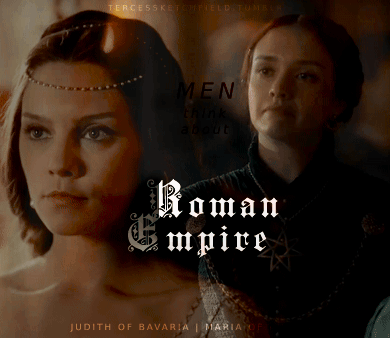
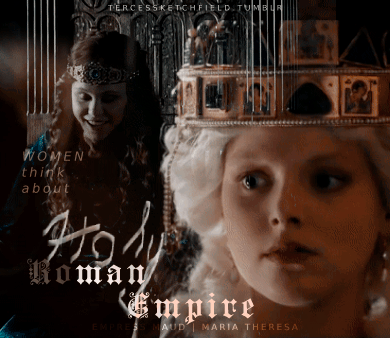
MEN THINK ABOUT ROMAN EMPIRE. WOMEN THINK ABOUT HOLY ROMAN EMPIRE
JUDITH OF BAVARIA (797-843) — Daughter of Count Welf I of Bavaria, Judith was a Carolingian Empress as the second wife of Louis I the Pious. Mother of Gisela and Charles the Bald, she foght for both her own influence at court and for the succession of her son over the claims of his elder half-brothers, the sons of Louis I from his first marriage. Charles became the Emperor in 875, after the death of Louis II, his nephew and a son of his half-brother Lothair / fancast: Annabel Scholey
MARIA OF AUSTRIA (1528-1603) — Daughter of Charles V, Holy Roman Emperor, and Isabella of Portugal. She served as Regent of Spain both jointly with her husband, Maximilian (before their accession to the imperial throne), and in person, for her father, and brother, Philip II. Her children include two Holy Roman Emperors, Rudolf II and Matthias, over whom she held great influence, and queens consorts of Spain, and France / fancast: Olivia Cooke
EMPRESS MAUD (1102-1167) — Daughter of Henry I of England and Matilda of Scotland. Her first marriage to the Holy Roman Emperor, Henry V, gave her the title under which she came down into history, and was a source of great pride to Maud. Rightful heiress of Henry I, she confronted her cousin, King Stephen, in the civil war, known as the Anarchy, fighting ferociously for her rights. She failed in this for herself but won for her son Henry, who became king and established the Plantagenet dynasty in England / cast: Alison Pill in The Pillars of the Earth (2010)
MARIA THERESA (1717-1780) — She succeded her father Charles VI as the ruler of Habsburg monarchy in 1740, and devoutedly defended it against its enemies in the War of Austrian Succession and the Seven Year's War. Wife of the Holy Roman Emperor, Francis I, she was a forceful personality and a competent ruler herself, reigning first in her own right, and later, jointly with her son Empreror Joseph II. Her children include two Holy Romam Emperors (Joseph II and Leopold II), queens consorts of Naples ans Sicily, and France / cast: Marie-Luise Stockinger in Maria Theresia (2017)
#historyedit#judith of bavaria#maria of austria#empress maud#empress matilda#maria theresa#maria theresia#perioddramaedit#history#women in history#perioddramasource#onlyperioddramas#tusereliza#userbennet#usermina#weloveperioddrama#cortegiania#perioddramagif#gifshistorical#my edit#*i have literally zero idea what is this lmao* but i really like it idk
138 notes
·
View notes
Text
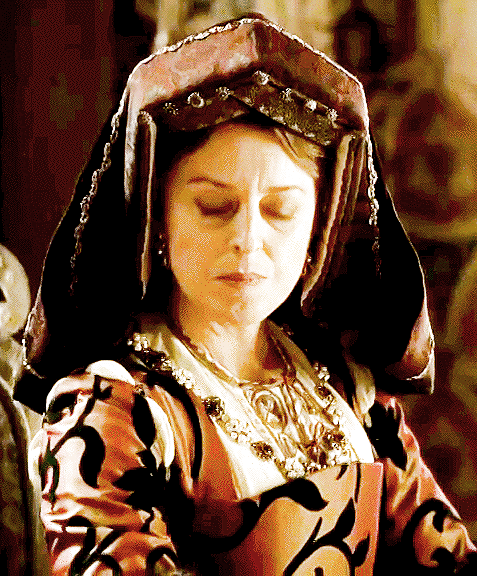
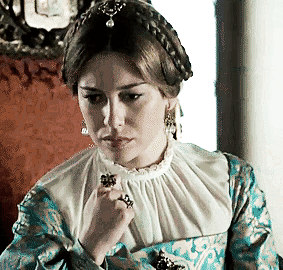
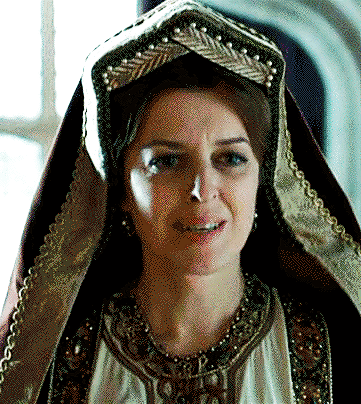
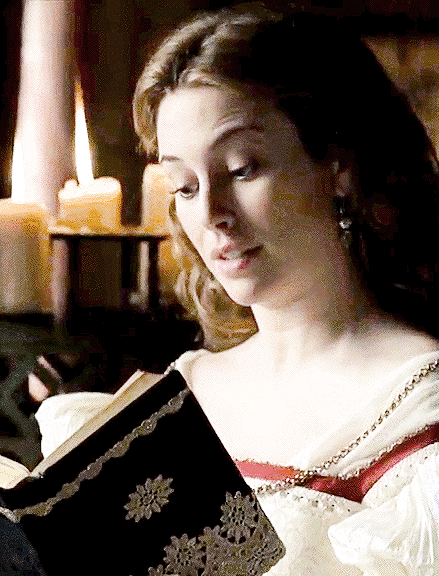

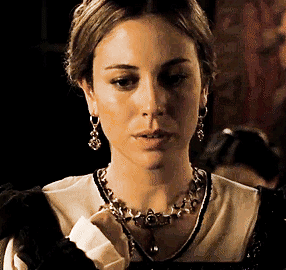
Katherine of Aragon & Isabel of Portugal
Holy Roman Empress Isabel of Portugal was interested in the case of the repudiation of her aunt the Queen of England, and she was an advocate of her cause. Katherine of Aragon knew that her nephew, Carlos V, was her only chance to defend her case successfully and that is why she wrote him. Since the death of King Fernando II of Aragon in 1516, her nephew had been her paterfamilias, the head of the Spanish Monarchy, and the most powerful monarch in Europe. Katherine played an active role as ambassadress in the Tudor court, and she was one of his biggest European supporters. Seven months after Katherine’s plead, Carlos sent a letter to his wife Isabel in Spain who was acting as his Governor during his absence. He entrusted her with a mission, to find evidence and witnesses that could help their aunt in her cause to defend her marriage.
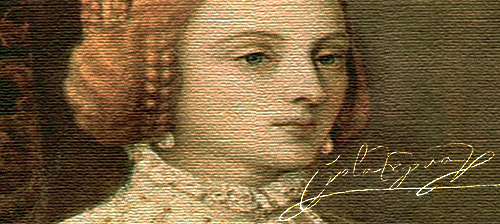
The Empress rejoiced that her husband Carlos V was so determined to defend the right of Queen Katherine, which, indeed, it were his duty to do; not only because she was his aunt but also because the case closely concerns the Christian religion itself. Isabel sent several orders to different parts of the Iberian Peninsula to gather evidence. The first was directed to the officers in the Chancillería in Aragon to look for any legal documents related to the marriage negotiations. Another order was sent to elaborate a list of people who were still alive and who had been witnesses in the negotiations concerning Katherine’s marriages. A second group of people were those who had accompanied Katherine to England in 1501. The third order included a questionnaire for these people that directly addressed Katherine’s virginity.
Katherine herself had written to her a full account of the case, of which copies were made to be sent to the Universities of Castile, Aragon, Valencia and Catalonia, with the orders of the Empress that the Universities are to study the case very carefully and send their opinions to her. Originals of the same shall be sent to the Emperor, and copies to Micer Mai in Rome.
In May 1531 a letter was rediscovered in Spain, written by Katherine’s father Fernando to his ambassador in Rome, Francisco de Rojas, which appeared to change everything. Katherine must have been excited to hear that it confirmed that Arthur had not consummated the marriage but that Rojas was to apply for a dispensation anyway in order to satisfy the English.
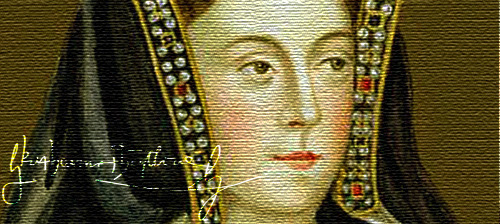
Empress Isabel was in contact with her ambassadors in Rome, France and London. Dr Pedro Ortiz, an expert in law and Lecturer at the University of Salamanca designated to defend Katherine’s case in the papal court, wrote to the Empress urging her to collect Katherine's letters as the future relics of a holy martyr. In another letter, Ortiz implored the Empress to pray for Katherine and Mary. He believed that they are in great danger.
The death of Katherine of Aragon on 7 January 1536 at Kimbolton Castle, was really sad for the Spanish Royal family. Carlos V was in Naples. By February 1, the Emperor wrote to his wife, who was acting as his regent in Spain, saying that he had heard of Katherine’s death “five or six days” previously. He told her that he and his court had donned mourning and that suitable obsequies had been performed.
Five or six days ago the news of the demise of her most Serene Highness the queen of England arrived, which I felt deeply, as you may imagine. May God receive her in Paradise, which she certainty deserved on account of her extreme goodness and virtue, and the excellent life she led. About her last illness and death the accounts differ. Some say that it was produced by a painful affection of the stomach, which lasted upwards of 10 or 12 days; others that the distemper broke out all of a sudden after taking some draft, and there is a suspicion that there was in it that which in similar cases is administered. I do not choose to make such an affirmation, nor do I wish to have it repeated as coming from me, but nothing can prevent people from judging and commenting upon the event according to their own feelings. Of the Princess, my cousin, I hear only that she is inconsolable at the loss she has sustained, especially when she thinks of her father’s past behaviour towards herself, and of the little favor she can expect for the future. I trust, however, that God will have pity on her, and will not permit the great injustice which has been shewn her to remain with- out some reparation. I have put on mourning, and ordered all the grandees around me, the high officers of this household, as well as the gentlemen of my chamber and table, to do the same, and I myself intend wearing it until I go to Rome. The exequies have been performed here as is customary in such cases; there, where you are, the same ought to be done, as this is but fitting.
Isabel felt Katherine’s death and she was surprised “by what is said of her death”, the rumors about a possible poisoning of her aunt. The Empress also received a letter from Dr Ortiz, enclosing a copy of one from ‘that glorious martyr’ Katherine herself ‘by which the Empress will see the perfection and heroic virtues to which she attained’. Katherine would be a ‘true patroness and advocate of the Empress in Heaven’.
Sources:
Amy Licence, Catherine of Aragon: An Intimate Life of Henry VIII's True Wife
Emma Luisa Cahill Marrón, Article: “Royal Sexualized Bodies at the Tudor Court” : Questioning an Honest Queen: The Scrutiny Around Queen Catherine of Aragon's Virginity
Julia Fox, Sister Queens: The Noble and Tragic Lives of Katherine of Aragon and Juana, Queen of Castile
#catherine of aragon#katherine of aragon#catalina de aragon#isabella of portugal#isabel de portugal#english history#spanish history#women in history
28 notes
·
View notes
Note
Hello, I saw your post about FrUK. It is a year old post, but I wanted to say that I feel like Spain and France's rivalry pales in comparison to France and England's, you should give England more credit I feel 😭😭 the latter rivalry's impact was still huge on respective nations, even if it wasn't always as equal as Brits make it out to be
Oh gosh, I would never argue that France and UK aren't tangled together for sure, nor would I argue against anyone who thinks the UK and France are permanently sitting in each other's top three most influential partners.
I just think... So to explain why I'm always a bit 'well yes but no' for them I mean, is The Plantagenet conflicts were very much a dynastic bickering between two families and England inserting themselves into French business, rather than 'the Kingdom of England' trying to overthrow 'the Kingdom of France'.
I think it was very much a French Duke based around West France (who was coincidentally King of England) quarralling with a French king based in Central and Eastern France. Does that make sense? You can argue it was much more of an internal civil war with troops from England being shipped over to support one side, rather than the clear-cut 1v1 conflict.
Like, it's based around different French Kings trying desperately to boot the other family off any claim to the French throne and gain control of land that 'should' be theirs. No French king ever really wanted England. Plenty of English Kings have wanted France, but only insofar in that they were French themselves. Normandy, Aquitane, Gascony, and England were all lumped together. England was useful because he gave them the title of King compared to the French lands, which were merely Dukes. That's the only reason England mattered in many respects in the 13th century. The Hundred Years War was based around a slight where England was not enough in of himself, his Kings were greedy and wanted more. The Plantagenet wanted those French lands back, and did horrific things to France in the process.
BUT!!! This for sure changes with time. By the time of Agincourt, it was not a French Duke with a supplementary English title of King versus the actual French King: it was now framed as England v France. One of the first instances of the great time that is English nationalism.
Like here, the French offer of peace in 1396 - it's all about how England needs to back the fuck off because there are bigger problems for the French -

It reads very much like Francis grumbling for Arthur to get a grip. We should be mates dumbo! It's why the Tudors I see as being such a huge shift for Arthur. He is enough, on his own, but he could be more. He, throughout that century, grows increasingly disillusioned with the mainland. He loses Burgundy and Portugal to Spain, and he loses Flanders to France. Those were his friends, you know??? He didn't have that many to begin with! They were taken as part of a broader dick measuring contest between Captiens and Habsburgs. England really didn’t feature in that decision making. Instead, Spain and France used England like a ping pong ball in their game to undermine the other. Ergo, Arthur cannot trust Europe. So he looks elsewhere for power and control. Cue the Americas. All an extension of this European conflict.
It's something I think Hetalia actually gets sort of right in the dynamic writing- England being seen as small and lesser and just plain envious and France only ever really engaging with him to crow about how much better the French are than England.
I suppose I just think of FrUK as being a shifting dynamic, which is always centred around Arthur's need to be on equal footing to Francis, and it takes him a long time to get there. It's just for the first 500 years, Arthur himself wasn't even of consequence to the people he looked to in order to complete this task (i.e. his Kings who weren't named Edward I or Henry IV). He was useful for his name - that bloody title of KING - and not much more. By the time we get to the Tudors, particularly Liz I, Arthur gets to hear he is the centre of the world, a beacon for freedom for Protestant Europe. I imagine then, the conflict between him and Francis becomes much more personal, ironically with Arthur dropping any claims to the mainland.
Arthur's priority is to make sure there's no single power on top in Europe from about 1500 on. Once the French had well and truly kicked out any Plantagenet pretence to their land, France's goal is to be the dominant power in (Western) Europe. Arthur will always butt heads with Francis. Francis will not necessarily always butt heads with Arthur, since Arthur has no want of being number one in Europe.
This has been such a ramble. This is long and confusing, sorry. I don't mean to sell FrUK short at all!! It truly is a rivalry and love for the ages, like God I have written too much here. I just felt like the Spain France element is critically undervalued in the English speaking fandom when I first spoke of them. At least, from 1000-1500, it's Francis against differing parts of himself (one of which is using Arthur as a brutal destructive hurricane in a misdirected payback for Normandy) . 1500-1700 its Antonio always. But 1700-1850, oh yeah, it's Arthur and Francis all the way, baby.
Or at least, that's one way to frame them! I hope this all makes sense. That's how I read the early years. At least. It's one way to read it rather! Not the only way. Not the right way, either!
Tell you what, I was reading Brendan Simms 'Britain's Europe' the other month (it was a pre Brexit narrative written trying to argue that we have never not been deeply tied into the mainland) and it's so interesting to me, how frightened we were of the mainland. I would love a book in reverse however, what actions did European states make to preempt or respond to English actions.
To contradict myself from all that above that is: There's this one bit about how, just after Charles II came back after Cromwell died, that France was invading the lowlands and how there was a bunch of European thinkers bemoaning England's withdrawal from mainland politics. England was seen (accurately or not) as a land of liberty. France was not. I just think it's a great little bit of storytelling:


Europe frequently banked on England interfering in French ambitions. These two didn’t have the courtesy to make their bizarre rivalry between them. Half the HRE, Italy, and the Lowlands counted on England's ability to shove themselves in as a bulwark against France. It crops up again of course during the 18th Century, then again during Pax Britannia and finally again (this time against Germany) in WWII. England has a history of being prescribed 'last man standing' when it comes to Europe. That is not to say that Europe is necessarily happy with them having such a title though hahaha.
It's a good wee book! Quick read for sure.
Sorry, gone off topic as always...
#hetalia#headcanon#I'm so sorry i don't think this os particularly coherent#trying to spin a cohesive narrative out of historical events is a losing battle haha#fruk#hws england#hws france#q&a#tldr it just seems nuch more the brits imposing themselves on france than vide versa#historical hetalia#conciseness? coherence? less likely than you think
27 notes
·
View notes
Text
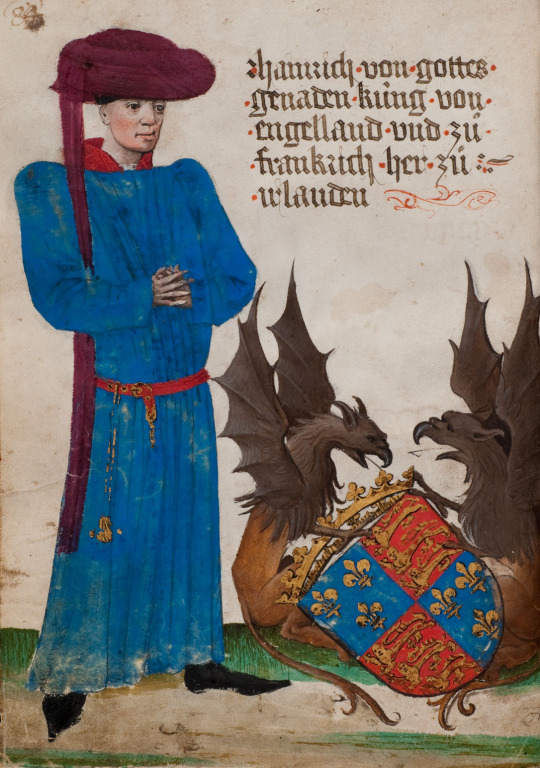
Drawing of Henry VI of England by Jörg von Ehingen.
From 1457-1459, Swabian knight Jörg von Ehingen traveled Europe participating in various campaigns; throughout, he kept a journal and sketchbook of his impressions of the many royal courts he passed through. His compilation includes portraits, in the order of his visits, of Duke Ladislaus V of Austria, Charles VII of France, Henry IV of Castile, Henry VI of England, Alfonso V of Portugal, Janus III of Cyprus, Duke René of Anjou, John II of Aragon, and James II of Scotland.
#we love a contemporaneous portrait from an eyewitness#absolutely dapper hat#you may be familiar with Alfonso V's incredible poulaine shoes and/or his terrible heraldic lion#Henry's got pretty swell poulaines himself#altho I have just noticed his lil skelly hands#plantagenets#manuscript
64 notes
·
View notes
Text
In case anyone is interested, here are some of the historical ships I am more than willing to write:
HOUSE OF TUDOR:
-Henry VII & Elizabeth of York.
-Arthur Tudor & Catherine of Aragon.
-Mary Tudor & Louis XII // Charles Brandon, 1st Duke of Suffolk.
(And no, I would rather not receive any Henry VIII related stuff)
HOUSE OF HAPSBURG:
-Maximilian I & Mary of Burgundy // Bianca Maria Sforza (pretty please, ask me to write about this two).
-Charles V & Isabella of Portugal.
HOUSE OF BURGUNDY - VALOIS:
-Philip the Good & Isabella of Portugal.
-Charles Martin (Charles “the Bold”) & Isabelle de Bourbon // Margaret of York.
HOUSE OF AVIS:
-Manuel I & Maria of Aragon.
HOUSE OF YORK:
-Richard of Conisburgh & Anne Mortimer.
-Richard of York & Cecily Neville.
-George of Clarence & Isabel Neville.
HOUSE OF LANCASTER:
-Henry VI & Catherine of France.
-Henry VII & Margaret of Anjou.
OTHERS:
-Matthias Corvinus & Beatrice of Naples.
-Yolande of France & Amadeo IX of Savoy.
-Anne of Brittany & Maximilian I // Louis XII
( This may interest you @catherinemybeloved / @dickon777 )
12 notes
·
View notes
Text
PENALTIES

2 notes
·
View notes
Text

USS Midway (CVB-41) steaming off the Firth of Clyde in original color during September 1952, prior to participating in NATO's Operation Mainbrace with eight other navies and over 200 ships. Midway would be reclassified the following month as CVA-41, indicating her tactical role as an attack carrier. Her original designation designated her as a large carrier - B for large, CV for carrier. Though the origins of the "CV" are definitely rooted in the "C" for "Cruiser" lineage, the reasoning for the "V" is as mysterious as the choice of "B" to represent "large" - but either way, the "V" is indicative of heavier-than-air flying machines, as opposed to "Z" for lighter-than-air, as specified in General Order No. 541 of 1920.
-
As an aside, the use of "CVB" for large carriers of the Midway-class in 1942 is further proof that the "B" in USN designation systems stood for "large," not "battle" - and thus, the Alaska-class large cruiser hull designation, "CB," does NOT indicate "battle" anything, much less battlecruiser.
-
Mainbrace featured ships from the US, Britain, France, Canada, the Netherlands, Portugal, Belgium, Denmark, and Norway, with the stated goal of showing the latter two nations that NATO could effectively confront a Soviet attack against them from the North Sea.
-
US Navy photo 80-G-K-13223.
23 notes
·
View notes
Text






Royal Birthdays for today, October 9th:
Denis, King of Portugal, 1261
Peter I, King of Cyprus, 1328
Leopold V, Archduke of Austria, 1586
Charles X, King of France, 1757
Prince Edward, Duke of Kent, 1935
Juliana Guillermo, Daughter of Princess Christina, 1981
#denis of portugal#peter i#leopold v#charles x#prince edward#Juliana Guillermo#royal birthdays#long live the queue
9 notes
·
View notes